高一英语下册Unit14-Festivals-知识点整理(良心出品必属精品)
高一英语Unit 14 Festivals(2)人教版知识精讲
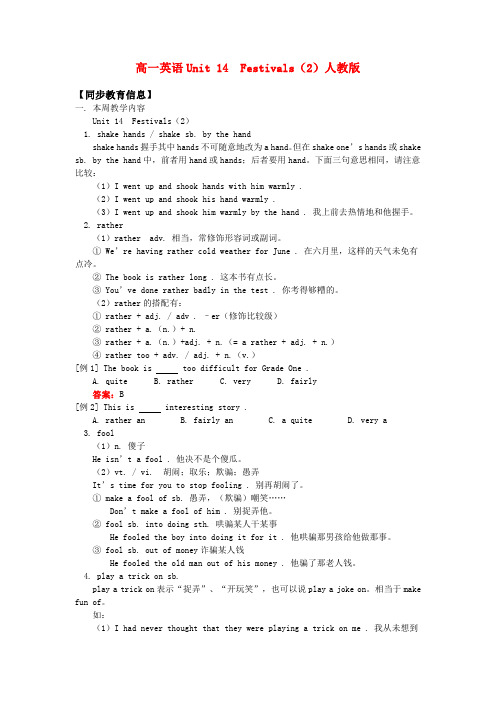
高一英语Unit 14 Festivals(2)人教版【同步教育信息】一. 本周教学内容Unit 14 Festivals(2)1. shake hands / shake sb. by the handshake hands握手其中hands不可随意地改为a hand。
但在shake one’s hands或shake sb. by the hand中,前者用hand或hands;后者要用hand。
下面三句意思相同,请注意比较:(1)I went up and shook hands with him warmly .(2)I went up and shook his hand warmly .(3)I went up and shook him warmly by the hand . 我上前去热情地和他握手。
2. rather(1)rather adv. 相当,常修饰形容词或副词。
①We’re having rather cold weather for June . 在六月里,这样的天气未免有点冷。
② The book is rather long . 这本书有点长。
③You’ve done rather badly in the test . 你考得够糟的。
(2)rather的搭配有:① rather + adj. / adv . –er(修饰比较级)② rather + a.(n.)+ n.③ rather + a.(n.)+adj. + n.(= a rather + adj. + n.)④ rather too + adv. / adj. + n.(v.)[例1] The book is too difficult for Grade One .A. quiteB. ratherC. veryD. fairly答案:B[例2] This is interesting story .A. rather anB. fairly anC. a quiteD. very a3. fool(1)n. 傻子He isn’t a fool . 他决不是个傻瓜。
高一英语下册Unit14 Festivals 知识点整理
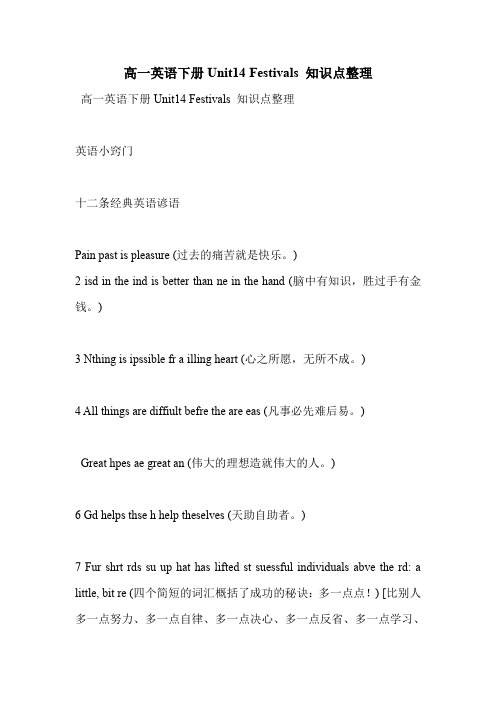
高一英语下册Unit14 Festivals 知识点整理高一英语下册Unit14 Festivals 知识点整理英语小窍门十二条经典英语谚语Pain past is pleasure (过去的痛苦就是快乐。
)2 isd in the ind is better than ne in the hand (脑中有知识,胜过手有金钱。
)3 Nthing is ipssible fr a illing heart (心之所愿,无所不成。
)4 All things are diffiult befre the are eas (凡事必先难后易。
)Great hpes ae great an (伟大的理想造就伟大的人。
)6 Gd helps thse h help theselves (天助自助者。
)7 Fur shrt rds su up hat has lifted st suessful individuals abve the rd: a little, bit re (四个简短的词汇概括了成功的秘诀:多一点点!) [比别人多一点努力、多一点自律、多一点决心、多一点反省、多一点学习、多一点实践、多一点疯狂,多一点点就能创造奇迹!]8 In ding e learn (实践长才干。
)9 East r est, he is best (东好西好,还是家里最好。
)10 T heads are better than ne (三个臭皮匠,顶个诸葛亮。
)11 Gd pan n the rad is the shrtest ut (行路有良伴就是捷径。
)12 nstant drpping ears the stne (滴水穿石)重点词汇解析1 hn(u)r vt(1)尊敬e g hildren shuld hnur their father and ther 孩子应该尊敬父母。
(2)对……表示敬意e g Flers ere plaed there t hnur his er鲜花摆放在那里为了纪念他(3)使感到荣幸e g u hnur us b being ith us tda今天你和我们在一起这是我们的荣幸。
优品课件之高一英语下册Unit 14 Festivals重点单词和短语汇总

优品课件高一英语下册Unit 14 Festivals重点单词和短语汇总高一英语下册Unit 14 Festivals重点单词和短语汇总Unit 14 Festivals 本单元重点单词 festival n. 节日 custom n. 风俗习惯 habit n. 习惯 symbol n. 象征 describe v. 描述favorite adj. 喜欢的 fight n. 战斗 crime n. 犯罪 allow vt. 允许 argument n. 争辩 celebrate v. 庆祝 major adj. 主要的create vt. 创造 ancestor n. 古人;前辈 characteristic n. 特征 principle n. 原则 community n. 社区;团体self-determination n. 自我作决定 solve vt. 解决 faith n. 真诚 lit v. 点燃(过去式) theme n. 主题 generation n. 一代人salute v. 向……致敬 reminder n. 提醒 occasion n. 时机 fool vt. 愚弄;捉弄本单元重点短语 compare with 与……进行比较make others happy 使他人幸福快乐 learn about 了解 spend on 在……方面花费 so that 以便 speak for 为……说话 the spirit of ……的精神 commercial activities 商业活动 by giving away 以放弃……的方式 have got to 必须 instead of 替代 get out of the car 下车 get off 下车 take off one's hat 摘下礼帽 look into the eyes 直视(某人的)眼睛 shake hands with sb. 与某人握手 make friends with 与……交朋友 the living and the dead 生者和死者 the cycle of life 生命周期 play tricks on sb. 捉弄某人优品课件,意犹未尽,知识共享,共创未来!!!。
高一英语Unit 14 Festivals人教版知识精讲

高一英语Unit 14 Festivals人教版【本讲教育信息】一. 教学内容:Unit 14 Festivals二. 教学目标掌握Unit14词汇及词性变化三. 教学重难点掌握课文中的重点句型的结构、用法Unit14 Festivalsdress,put on,pull on,wear,have on,be input on与pull on相近,指穿衣的动作;dress指给别人穿上衣服,或用于被动语态be dressed in;wear,have…on与be in …都是穿着…The boy is too young to dress himself.The boy is too young to get himself dressed.The boy quickly put/pulled on his T-shirt.That girl wears/is wearing a skirt.The old man was in a pair of black shoes.That girl is (dressed) in a red skirt.dress up指装扮,打扮,整装待发等We have dressed up for starting.possibly,maybe,perhaps,probablypossibly是普通副词,表示的可能性最弱;maybe和perhaps很相近,只能用于句首或句尾;probably是最肯定的,语气最强,与possibly用的位置相同是普通副词。
What he told me is possibly true.What he told me is probably true.Maybe/Perhaps he is right.nature n. 自然,天性nature当“天性,自然,自然界,自然规律”等讲时是不可数名词,Nature creates human beings.The material has the nature of glue.He is a man of good nature.She is kind by nature.rather than instead of相似“而不是,替代”He is a friend of us rather than a teacher.He is rather a friend of us than a teacher.He hates it rather than like it.conflict n./v. 矛盾,冲突the conflict between A and BA andB conflict/A conflicts with Bhonor n./v. 荣誉,致敬It’s an honor to do/thatyour/his/her honorhonor sb./sb. be honoredancestor n. 祖先nation n. 国家nation,state与countrynation强调“民族”上的国家;state强调“政治,政权”上的国家;country强调“版图”上的国家。
高一英语下册Unit14-Festivals-知识点整理
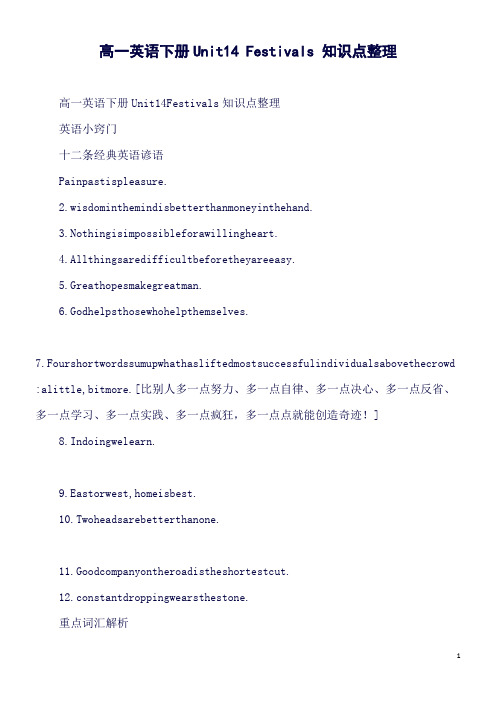
高一英语下册Unit14 Festivals 知识点整理高一英语下册Unit14Festivals知识点整理英语小窍门十二条经典英语谚语Painpastispleasure.2.wisdominthemindisbetterthanmoneyinthehand.3.Nothingisimpossibleforawillingheart.4.Allthingsaredifficultbeforetheyareeasy.5.Greathopesmakegreatman.6.Godhelpsthosewhohelpthemselves.7.Fourshortwordssumupwhathasliftedmostsuccessfulindividualsabovethecrowd :alittle,bitmore.[比别人多一点努力、多一点自律、多一点决心、多一点反省、多一点学习、多一点实践、多一点疯狂,多一点点就能创造奇迹!]8.Indoingwelearn.9.Eastorwest,homeisbest.10.Twoheadsarebetterthanone.11.Goodcompanyontheroadistheshortestcut.12.constantdroppingwearsthestone.重点词汇解析1.honorvt.尊敬e.g.childrenshouldhonourtheirfatherandmother.孩子应该尊敬父母。
对……表示敬意e.g.Flowerswereplacedtheretohonourhismemory.鲜花摆放在那里为了纪念他使感到荣幸e.g.youhonourusbybeingwithustoday.今天你和我们在一起这是我们的荣幸。
Iamhonouredtobeaskedtospeakhere.被邀请在此讲话是我的荣幸。
honourn.荣誉,光荣e.g.Theyfightforthehonouroftheircountry.他们为祖国的荣誉而战。
英语总复习:unit14《festivals》(大纲版第一册).doc

英语总复习:Unit14《Festivals》(大纲版第一册)I.单元知识点全览工欲善其事必先利其器高考须掌握的词汇:1.argue 2.majority 3.probable 4.honourable 5.national 6.create 7.faithful 8.commerce 9.simila rly1o.salutation 11.celebrate 12.respectful/respectable 13.foolish 14.inwte高考须掌握的短语:1.up 2.in 3.on 4.inⅡ.考点过关过关斩将一马平川考点详解精剖细解入巿三分一、重点词汇1.symbol n.象征;符号;记号eg:In this picture the tree is the symbol of Iife and the snake is the symbol of evll.这幅画中树是生命的象征,蛇是邪恶的象征。
相关链接:syrflbolic adj.象征(性)的;用符号表示的symbolism n.象征主义symbolist n.象征派作家或艺术家。
用法拓展;the symbol of………的象征the symbol f0 r…代表……的符号案例剖析旁征博引举一反三考题1 (典型例题he lion is consid-ered the king of the forest as it is a(n) of courage and power.A.example B.signC. mark D. symbol考题1点拨:答案为D。
example例子;sign招牌,征兆,迹象!mark痕迹,记号;symbol象征。
句意为:“狮子被认为是森林之王,因为它是勇气和力量的象征。
2.0pinion n.意见;看法eg:一His opinions are usually based on facts.他的看法通常有事实根据。
(整理版高中英语)高一下学期词汇解析Unit14Festivals
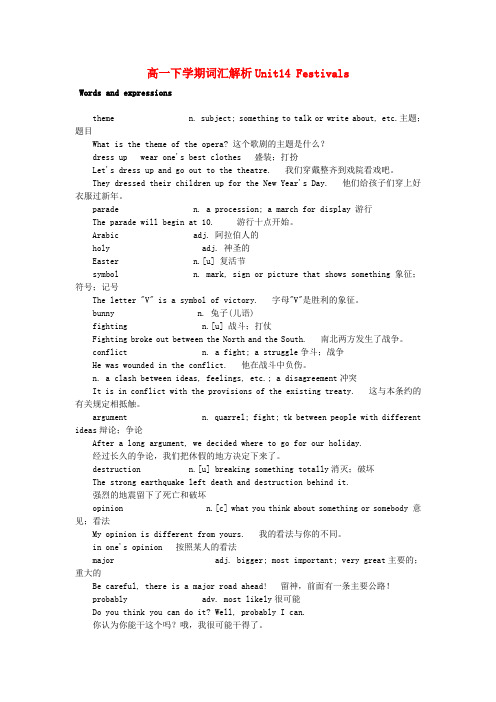
高一下学期词汇解析Unit14 FestivalsWords and expressionstheme n. subject; something to talk or write about, etc.主题;题目What is the theme of the opera? 这个歌剧的主题是什么?dress up wear one's best clothes 盛装;打扮Let's dress up and go out to the theatre. 我们穿戴整齐到戏院看戏吧。
They dressed their children up for the New Year's Day. 他们给孩子们穿上好衣服过新年。
parade n. a procession; a march for display 游行The parade will begin at 10. 游行十点开始。
Arabic adj. 阿拉伯人的holy adj. 神圣的Easter n.[u] 复活节symbol n. mark, sign or picture that shows something象征;符号;记号The letter "V" is a symbol of victory. 字母"V"是胜利的象征。
bunny n. 兔子(儿语)fighting n.[u] 战斗;打仗Fighting broke out between the North and the South. 南北两方发生了战争。
conflict n. a fight; a struggle争斗;战争He was wounded in the conflict. 他在战斗中负伤。
n. a clash between ideas, feelings, etc.; a disagreement冲突It is in conflict with the provisions of the existing treaty. 这与本条约的有关规定相抵触。
高中英语 词汇讲解(Unit 14 Festivals)人教版

Unit 14 Festivals Warming up,Listening and Speaking词汇讲解三点剖析1.People celebrate Mardi Gras by dressing人们通过穿着盛装观看游行来庆祝狂欢节。
dress up盛装;打扮;装饰【典型例句】You don’这次去吃饭你不必穿正式的服装。
Everyone who work迪斯尼乐园的每个工作人员都必须穿19世纪的服装。
大多数小女孩都喜欢打扮成天使。
【要点归纳】dress (sb./oneself) up可及物,也可不及物,常译为“(把某人)打扮(成)……”,可与as,like或in连用。
【相关链接】辨析get/be dressed,dress up,dress oneself,dress in,put on,have on和(1)dress sb.表示“穿衣”时其宾语只能是人;get/be dressed 穿好衣服(表示状态);dress up(为了某场合)盛装,打扮;dress oneself给自己穿衣服,打扮;dress oneself up 把自己打扮起来;dress sb. in...给某人穿穿……(表示状态)。
(2)put on 穿上,戴上(表示动作)。
(3)have on“穿”(衣服、袜子、鞋子、戴帽子等),表示状态,无被动形式和进行时态。
(4)wear广泛用于“穿戴”,包括戴手表、首饰、眼镜,留头发、胡须等。
例如It’s Children’在儿童节,所有的孩子们都穿着新衣。
并非所有的人都喜欢戴手表,尤其是大热天。
随堂演练选择(1)As she entered the hall,we noticed her __________A.wearingC.putting on提示:此处使用wear的现在分词形式表示状态。
答案:A(2)__________ smart clothes,he fooled a lot of people into believing he is a richA.DressingC.Dressed up提示:be dressed in表示穿着状态,用作状语,因而使用过去分词形式。
高一英语Unit 14 Festivals(1)人教版知识精讲

高一英语Unit 14 Festivals(1)人教版【同步教育信息】一. 本周教学内容:Unit 14 Festivals(1)1. dress updress作“打扮自己”的解释,与介词as或like连用,或用dress up as sb. 或like 连用,或用dress up as sb. 或dress up for sth.。
(1)They all dress up as PLA men . 他们都打扮成解放军模样。
(2)She dressed up in Elizabethan costumes for the fancy dress ball .她穿上伊丽莎白时代的服装去参加化装舞会。
(3)The little boy likes to dress himself as a policeman . 这小男孩喜欢扮成警察。
2. get together 聚集,相聚在一起I hope we can get together one day . 我希望有一天我们能相聚一处。
get-together n. 聚会,联欢会We had a get-together last Saturday . 上周六我们举行了一个聚会。
3. greet(1)vt. 向……问候,欢迎,打招呼① They were waiting at the airport to greet him . 他们在机场等候迎接他。
②He greeted his friend by saying “ Good morning ! ”他向他的朋友道“早安”致意。
③ He greeted me with a kiss . 她以一个吻迎接我。
④ The news was greeted with general cheers . 那个消息受到了大家的欢呼。
(2)映入(眼帘);传入(耳中),扑鼻The smell of coffee greeted me when I entered the room .我进入那个房间的时候,咖啡味扑鼻而来。
英语:高一Unit14Festival知识例析(标准版)

英语:高一Unit14Festival知识例析英语:高一 unit 14 festival知识例析知识点例析i1._______ with the size of the whole earth, the highest mountain does not seem high at all.a.when compared b.compare c.while comparing d.comparing 析前后句子没有连词连接,后一句是个完整的句子,说明前一句是非谓语动词短语作状语,compare没带自己的逻辑主语,所以和主句的主语是同一主语,它们之间是被动关系,因此用被动形式,选a。
2. he sees very badly; he _______ wear glasses all the time. a.may b.must c.can d.has to析由第一句话所设语境,说明戴眼镜是他不得已的,无可奈何与他的主观意志无关,是客观的情况——“眼睛不好使”让他不得不戴上眼镜,只有d项强调客观需要,答案为d。
分清have to与must的用法区别,结合语境解题。
3. to do well on the test, _______.a.the four choices should be looked at carefully before you make a choiceb.don’t answer anything before a careful look at the four choicesc.before you choose an answer, carefully look at the four choicesd.look at the four choices carefully before choosing an answer 析写一个句子时应十分注意整句的逻辑关系,不仅介词,动名词,不定式的逻辑主语要与主句保持一致,而且复合句中的逻辑关系也不能颠倒。
高中英语最新-高一英语下学期unit 14 festivals 精品
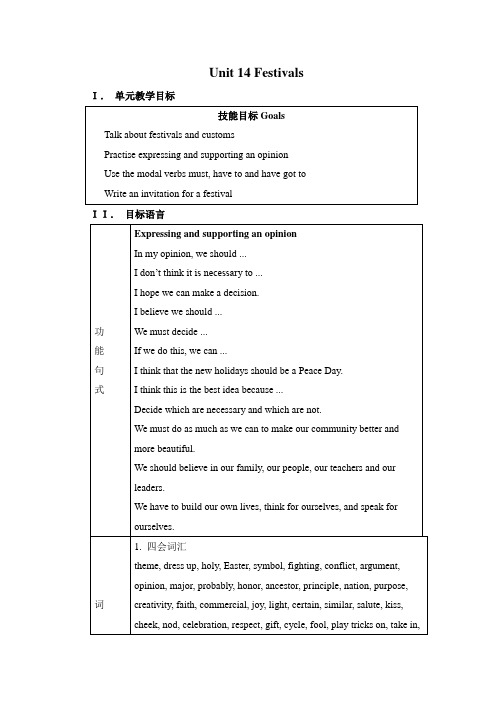
Unit 14 Festivals I.单元教学目标II.目标语言III.教材分析1. 教材分析本单元以festivals为话题,旨在通过单元教学,使学生了解世界各地不同的节日的来历、意义和风俗,学会表达和支持个人观点,能用所学的有关festivals 的词汇描述一个熟悉的节日,能创设一个新节日并能向他人介绍其意义,能写节日的邀请函,能回复关于中国节日情况介绍的信件。
1.1 WARMING UP 提供了三幅有关Halloween(万圣节),Obon(盂兰盆节),Day of the Dead(鬼节)图片,让学生用已有的知识和经验讨论所给节日的来历和习俗等问题,并根据提示对比一个中国的节日和一个外国的节日。
1.2 LISTENING是关于几个著名节日(油腻的礼拜二;斋月;复活节)的听力材料,难度中等。
听后与同伴合作描述一个你熟悉的节日。
1.3 SPEAKING 根据材料,四人小组合作,要求decide what a new holiday should be about,然后准备一个角色卡并向其他组的同学讲述why your holiday is the best one,锻炼语段表达能力。
1.4 PRE-READING是READING的热身活动。
它要求采用与同学讨论交流的方式谈论春节等节日的习俗和意义。
1.5 READING是一篇介绍非裔美国人的Kwanzaa节的说明文。
Have a full understanding of the birth of a new festival.1.6 POST-READING第一个训练题所给的几个问题,都不是用一句话就能回答清楚的,而是要通过挖掘文章的深层含义,激活学生自身的认知能力和思想认识能力,概括成一段话来回答。
要求是:在理解的基础上,重点训练学生的概括能力。
第二题仍然是概括能力训练题。
1.7 LANGUAGE STUDY 分词汇和语法两部分。
其中,Word study 是根据语境在运用中掌握词汇。
高中英语Unit 14 Festivals--Period 4旧人教版第一册下
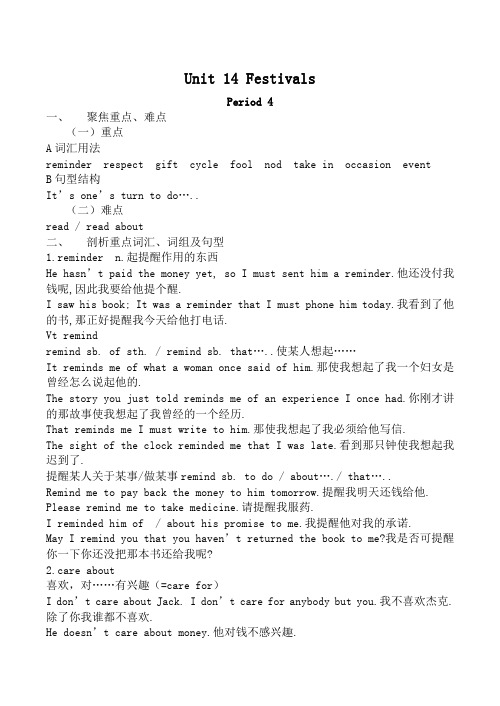
Unit 14 FestivalsPeriod 4一、聚焦重点、难点(一)重点A词汇用法reminder respect gift cycle fool nod take in occasion eventB句型结构It’s one’s turn to do…..(二)难点read / read about二、剖析重点词汇、词组及句型1.reminder n.起提醒作用的东西He hasn’t paid the money yet, so I must sent him a reminder.他还没付我钱呢,因此我要给他提个醒.I saw his book; It was a reminder that I must phone him today.我看到了他的书,那正好提醒我今天给他打电话.Vt remindremind sb. of sth. / remind sb. that…..使某人想起……It reminds me of what a woman once said of him.那使我想起了我一个妇女是曾经怎么说起他的.The story you just told reminds me of an experience I once had.你刚才讲的那故事使我想起了我曾经的一个经历.That reminds me I must write to him.那使我想起了我必须给他写信.The sight of the clock reminded me that I was late.看到那只钟使我想起我迟到了.提醒某人关于某事/做某事remind sb. to do / about…./ that…..Remind me to pay back the money to him tomorrow.提醒我明天还钱给他. Please remind me to take medicine.请提醒我服药.I reminded him of / about his promise to me.我提醒他对我的承诺.May I remind you that you haven’t returned the book to me?我是否可提醒你一下你还没把那本书还给我呢?2.care about喜欢,对……有兴趣(=care for)I don’t care about Jack. I don’t care for anybody but you.我不喜欢杰克.除了你我谁都不喜欢.He doesn’t care about money.他对钱不感兴趣.He cares about music. 他喜欢音乐.关心(=care for)He used to care about only his own family, but he has greatly changed now. 他过去只关心自己的家庭,但现在他变了.She thinks only of herself; she doesn’t care about other people.她只考虑自己,不关心别人.care for除了同care about意思相同外,还可表示“照顾”“照料”:She cares for the child as if he were her own.她照料这孩子就像这孩子是她自己的.The sick must be cared for.必须照料好病人.3.respectVt.尊敬,尊重Respect your elders.尊敬你的长辈.He is much respected in our town.在我们镇上他非常受人尊敬.n. have respect for / show respect toI have much respect for him.我非常尊敬他.You should always show respect to your parents.你应该时时尊敬你的父母. The chief had the respect of everyone in our village.这首领受到我们村庄每个人的尊敬.with respect尊敬地爱护,重视You must have respect for school buildings, parks and other public property.你必须爱护学校的建筑,公园和其它公共财产.We must have respect for the needs of the general reader.我们必须重视普通读者的需要.n.(PL)敬意,问候(=regards)Give my respects to your family.代我向你家人问好.方面In many respects, he is the best boy we have had in our school.在很多方面他是我们学校最好的学生.adj. respectful尊敬的 be respectful to sb.对某人尊敬的I hope you’ll be more respectful to your father.我希望你对你父亲更尊敬.4.celebrate the memory of进行纪念…….的活动in memory of纪念The building was named Ford in memory of a man called Ford.为纪念一个叫福特的人这幢楼就以他的名字命名.5.the living活着的人定冠词the+adj.表某一类人,作主语时谓语动词常用复数:The sick were being well looked after.病人被照顾得很好.The wounded have been sent to hospital.伤者已被送到医院去了.the dead死人 / the young年轻人 / the old 老人/ the blind 盲人/ the deaf 聋人1.each other互相(指两人之间),one another指两人或两人以上They both helped each other.他们互相帮助.They talked to each other in class.他们课上互相讲话.We should learn from each other.我们应互相学习.They sat side by side and chatted to one another.他们肩并肩坐着聊天.所有格为each other’s / one another’s2.cyclen.周期,循环A cycle of the sun takes a year.太阳转一圈需一年.自行车,摩托车 bicycle, motorcycleVi.骑自行车We cycled through the park.我们骑车穿过公园.cycle to school 骑车上学/ cycle home骑车回家3.happen发生(不用被动语态)(1)happen to sb.某人发生某事What happened to you last night?你昨晚发生什么事?What do you think has happened to her?你觉得她发生什么事了?(2)happen to do / be doing / have done碰巧做/正做/已做……I happened to be out when you visited me last night.你昨晚来看我时我碰巧不在家.She happened to be reading English when her mum came in.当妈妈进来时她碰巧在读英语.I happened to have lent my tape to my brother when you came to ask for it.你来借磁带时我碰巧已借给了我弟弟.(1)句型It (so) happen(ed) that………表示”碰巧…….”上述几句可转为:It happened that I was out when you visited me last night.It happened that she was reading English when her mum came in.It happened that I had lent my tape to my brother when you came to ask for it.4.fooln.傻瓜,傻子What a fool I was to think that she really loved me.我真是个傻瓜以为她真的爱我.make a fool of sb.欺骗,愚弄,捉弄Her classmate made a fool of her by telling that she was wanted by the teacher.她的同学捉弄她说老师叫她去.Vt.欺骗,愚弄Each time he tried to fool me, I could see through.每次他试图骗我时,我总能识破他.adj. foolish傻的, 愚蠢的It’s foolish of sb. to do…..=Sb. is foolish to do….某人做某事是蠢的. How foolish it is of you to have said so!你这么说真蠢!He can’t have done such a foolish thing.他不可能做了这么蠢的事.5.read / read aboutread指阅读书报\杂志\信件等具体内容:read a book / letter/magazine / newspaper / an article / Englishread about读到有关什么消息,阅读到有关内容I read about his marriage in the newspaper.我在报上读到他结婚的消息. He likes reading about ancient people.他喜欢阅读有关部门古人的文章. read/say还可表示”上面内容为……”What does the letter say?信上说什么啦?The notice says”Friday afternoon, in Room 201.”通知上写着”星期五,201房间”.The sign over there says “No parking.”那边的标牌上写着”不许停车”The ticket reads “From London to Scotland.”票子上写着“从伦敦到苏格兰”.6.It’s one’s turn to do…….该轮到某人做某事turn作名词,表示”轮流”Whose turn is it to clean the blackboard?该轮到谁擦黑板了?He felt it was his turn to speak.他觉得该轮到他发言了.也可以说:It came to one’s turn to do……Wait until it’s your turn.等着轮到你吧.My turn will come.快轮到我了.You’ve missed your turn, so you’ll have to wait.你刚才轮到时你错过了,因此你还得等.相关词组:by turns轮流,一阵一阵地They laughed and cried by turns.他们一阵哭一阵笑.in turn轮流着,替换地,一个挨一个地Each man in turn got up and spoke.每个人轮流站起来发言.We went in turn to be examined by the teacher.我们轮着进去让老师对我们考查.We drove in turn / by turns, so we weren’t tired at all.我们轮流开车,因此一点都不累.take turns to do / (at) doing轮流做某事Since we took turns (at) driving, so we didn’t find the trip too tiring.由于我门轮流开车,因此我们不觉得旅途劳累.rmation信息,情报,资料,情况(UN)a piece of information一条信息We have no information about where she has gone.我们没有任何她去了哪儿的信息.That’s a useful piece of information.那是条有用的情报.Vt. inform告知,通知inform sb. of sth. / inform sb. that……/ inform sb. 疑问词+to doI informed her that I was to send for a lawyer the next day.我告诉她我第二天就派人去请律师.I was informed that the meeting would be put off.我被告知会议将推迟. He informed me of his arrival by phone.他打电话告诉我他到了.Please informed me how to find his house.请告诉我怎么找到他的房子. Keep me informed of the fresh developments.请随时告知我发展情况.be well-informed消息灵通的He’s a well-informed man.他是个消息灵通人士.8.forget to do忘记要做某事(动作未发生) forget doing忘记做过某事(动作已发生)类似结构有:remember to do 记住要做某事/ remember doing记得做过某事regret to do 遗憾地说(告诉等)/ regret doing后悔做过某事mean to do 欲(打算)做某事/ mean doing意味着做某事try to do 企图、尽力做某事/ try doing试试做某事stop to do 停下来做某事/ stop doing停止做某事go on to do 接下来做某事/ go on doing继续做某事------Look, the light is still on.------Oh, I’m sorry I forgot to turn it off.瞧,等还亮着.噢,对不起,我忘了关等灯.I’ll never forget hearing him singing this song.我永远也忘不了听到他唱这首歌.Please remember to post this letter for me when you pass by the post office.请记住你经过邮局时别忘了帮我把这封信寄了.--------Have you returned the book to him?--------Yes, I returned it to him the moment I saw him this morning.那把那本书还给他了吗?是的,我今天早上一见到他就还给他了.I regret to say that you’re not allowed in.我很遗憾地告诉你不允许进去.I regretted telling her the truth. Listen , she’s crying sadly.我后悔告诉她事情真相了.听,她现在哭得很伤心.I only meant to help him. I didn’t mean to hurt him.我只是想要帮助他.我没想伤害他.Not finishing the exercise means being punished.不完成练习意味着被罚. He tried to improve his oral English by chatting with some foreign teachers.他想通过跟外籍教师聊天来提高口语.Why not try using this method?为什么不试试用这种方法呢?On the way I met my aunt , so I stopped to talk to her.在路上,我碰到我姑姑,因此我停下来跟她讲话.Please stop doing that silly thing.请停止做这种傻事.He went on to watch TV after he copied all the words抄完单词后他接下来看电视了..They went on working although it was getting dark.虽然天黑了他们继续工作.9.hostn.主人,东道主 hostess女主人,飞机上服务员A good hostess makes her guests comfortable.好的女主人能使她的客人感到舒服.Last night we were hosts to a few friends.昨晚我们请客几个朋友.the host country for the Olympic Games奥运会东道主Vt.招待(客人)China will host the 2008 Olympics.中国将举办2008年奥运会.10.occasion场合,日子,时刻(与on连用)I have met this man on many occasions.我在很多场合碰到过这人.It’s a most joyful occasion.那是令人愉快的时刻.I sent him my best wishes on this happy occasion.在这愉快的日子我送给他我最好的问候.时机,机会She seized / took this occasion to invite him for a short visit.她抓住时机邀请他去短简短的拜访.I want to take this occasion to thank you.我想利用这机会向你表示感谢. adj. occasional间或发生的,偶尔的He pays me occasional visits.他偶尔去拜访.She likes an occasional glass of wine.她偶尔喝杯酒.adv.偶尔,隔些时候They occasionally came to see me.他们偶尔来看看我.It snowed occasionally but not enough for skiing.偶尔下雪但滑雪的话还远远不够.11.event事件,事Two events received national attention this year.今年有两件事引起全国人民的注意.(运动)比赛项目The next event will be the 100 yards race.下面一个项目100码赛跑.quite an event重要的事,大事Meeting you was quite an event for her.对她来说见你是件很重要的事.12.take in欺骗,哄骗,使上当He took me in with his story.他编个故事使我上当.I don’t want to be taken in by those salesmen.我不想上这些销售人员的当. 让……在家居住、食宿,收留The farmer took in the lost travelers for the night.这农夫收留这些迷路的旅行者过夜.He had nowhere to go, so I took him in.他没处可去,因此我收留了他.(接活)在家干For a time, she took in washing.有一段时间她接了衣服在家洗.She sometimes took in work to do at home.她有时接活在家干.理解,领会,明白I can’t take in your meaning.我不懂你的意思.把衣服改小,改瘦Please take in the waist of the dress a little.请把这衣服的腰部改小一点. 订阅Which newspaper do you take in?你订阅哪一份报纸?13.gift礼物=presentI gave him a dictionary as a gift for his birthday.我给他一本字典作为生日礼物.Officials re not allowed to accept gifts from the public.官员不允许接受公众的礼物.天赋have a gift for有某方面天赋a man of gifts = a gifted man一个有天赋的人He has a gift for music.他有音乐天赋.He is a man of excellent gifts.他是个很有天赋的人.He has a natural gift for teaching.他天生有教书的能力.gifted adj.有天赋的,有才能的The child attends a school for gifted children.这孩子上了天才班.He’s really a gifted man.他真是个很有天赋的人.三、教与学师生互动Step 1. Lead-inRevision of some major festivals. Talk about them.Step 2. PresentationI.Read aloud four short passages on P13.II.Talk about these festivals as much as students can.Step 3.ReadingI.Read carefully those passages and answer the questions below:1.When is Earth Day? How do people celebrate it? What’s the purpose?2.When is Martin Luther King, Jr Day?Why do people celebrate it?What’s the theme?3.Who do people celebrate on the Day of the Dead?How do people celebrate it?4.When is April Fools’ Day? What do people do on that day?II.Go through it and deal with some language pointsStep 4. PractiseI.Try to think of some similar Chinese festivals and talk about it using when / who / what / how / why questions.II.Try to create a new festival. Say sth. about : Name, Date, Meaning, the way to celebrate it.III.Give a short description of the new festival and write it down. Step 5.ConsolidationUse the information about the new festival to write an invitation letter: invite your guests to take part in the festival.Two steps when you write:1.Explain your festival, including name ,date , meaning and so on.2.How it will be celebrated , including the date , the place and theactivities.3.Say how interesting and important the festival is and invite him / herto come.四、课堂跟踪反馈I.Translate the following sentences:1.这张照片使我想起我的童年时代.2.我没那么容易被你骗.3.该轮到你发言了.4.我还记得十年前第一次见到你.5.他对我不怎么在乎.II.Choose the best answers:1.I_______ his death in the newspaper. It’s really a surprise.A. readB. heardC. read aboutD. heard of2.______fish ate _____food .A. So little, so muchB. So few, so muchC.So little, so manyD. So few, so many3.We often go there by bus. Why not _____ ______ by bike this time?A.try to goB. try goingC. to try to goD. to try going4.He happened ______ when I dropped in. So I meant to call on him after he came back.A.to go abroadB. to be going abroadC. to have gone abroadD. to benot in5.He felt unhappy at _____ at the party.A. making a fool ofB. being made a fool ofC. being made a foolD. making a fool of himHomework:I.Finish all the exercises in this unitII.Preview the words and expressions in the next unit.Suggested answers:四.I.1.This photo reminded me of my childhood.2.It’s not so easy for me to be taken in by you.3.It’s your turn to speak.4.I still remember seeing you for the first time 10 years ago.5.He cares little for / about money.II.CABCB二.典型例题剖析:( )1. _______ that he’ll be sent to Beijing to get further training next month.A. It seemedB. He seemsC. It seemsD. He seemed答案C.解析:It seems that …..是一种常见句型.seem的意思是”似乎””好像”,使句子变得比较委婉,不那么肯定.本句还可以写成:He seems to be sent to Beijing to get further training next month.由后面的will可知选C.( )2.She happened ______ me when I passed by.A. not seeingB. to not seeC. not to seeD. having not seen答案C.解析:本题考查happen(碰巧)的用法.happen后可接不定式作宾语,不用动名词.排除A,D,,不定式的否定式是在to前面加not,never. 另外happen后的不定式有一般式,进行式及完成式.如:He happened not to be watching TV when his father entered the room.He happened to have told me the news before the meeting.( )3.They seem ______ each other for a long time.A. knowingB. to knowC. having knownD. to have known答案D.解析:本题考查seem一词的用法.seem后可接分词作表语,表主语所处的状态或特征.如:The story seems moving.They seemed greatly moved by his words.但此题不符.seem后也常接动词不定式,表示主语的动作,也可根据动作发生的时间分为一般/进行/完成式.本题从for a long time可知应用完成式.三.能力测试平台选择题1.She _____ swim in the river when she was young.A. used toB. got used toC. is used toD. was used to2.Dr. Bethune didn’t ______ whether he rested or not.A. care forB. careC. care aboutD. take care3.Let’s get through the work quickly. _______ seems to be little time leftnow.A. ItB. ThatC. ThereD. We4.Try to make as ______ mistakes as possible in your homework.A. littleB.muchC. fewD. many5.Black people united together to fight _____ slavery _____freedom.A. against……forB. for…..againstC. for….forD. against……against6.he had left his key at school. So he had no choice but ______.A. wait for his mother to come backB. to wait his mother to come backC. wait for his mother come backD. to wait fir his mother come back7.The tourist industry has ______ a variety of jobs.A. inventedB. developedC. discoveredD. created8.He wrote a novel _____ his schooldays.A. basing onB. based onC. to base onD. to be based on9.John plays football ______ , if not better than, David.A. as wellB. as well asC. so wellD. so well as10.He got up so early ______ miss the bus.A. as toB. as to notC. as not toD. that11.Your sports shoes are really nice. I’ll buy the same shoes ______ yourstomorrow.A. asB. thatC. whichD. with12.Please join the queue and wait for your ______.A. chanceB. turnC. timeD. order13.Mother is _____ the big cake among these children so that everyone canhave one piece.A. offeringB. givingC. sharingD. sparing14.Next time you ______ there, please take your wife along with you.A. goB. wentC. are goingD. will go15.Jack does well in drawing. It seems to me that he has a gift ______drawing.A. inB. onC. atD. for五.研究性学习通过图书资料网络查询各国的主要节日,了解这些节日的来源和意义,以更好地了解不同国家的文化背景及风俗习惯.Unit 14 CEvery parent watches eagerly the child’s achieving(获取)each new skill, the first spoken words, the first independent steps, or the beginning of reading and writing. People often hurry the child beyond his natural learning speed, but this can set up dangerous feelings of failure and states of great worry in the child. This might happen at any stage. A baby might be forced to use a toilet too early. A young child might be encouraged to learn and read before he knows the meaning of the words he reads. On the other hand , if a child is left alone too much, or without any learning chances, he loses his natural interest for life and his wish to find out new things for himself.Learning together is a fruitful source(有益的来源) of relationship between parents and children. By playing together , parents learn more about their children and children learn more from their parents. Toys and games which both parents and children can share are considered to be an important means of achieving this co-operation(合作). Building blocks and crosswords are good examples.Parents are different greatly in their degrees of strictness towards the children. Some may be especially strict in money matters; others are serious over times of coming home at night; being on time for meals or personal cleanliness. In general, the controls show the needs of the parents and the values of the people there as much as the child’s own happiness and interest.8.Eagerly watching the child’s achieving new skills________.A. will end in nothingB. sets up dangerous states of worryC.is very common among parentsD. is often considered a bad way of teaching them9.The encouragement of children to achieve new skills ________.A. should be left to school teachersB. can always be helpfulB.will always help their development D. should be carefully balanced (平衡)between too much pushing and having too little pushing1.By playing together ____________A.children have more chances to learn from their parentsB.parents learn more about the world from their childrenC.parents can have a better knowledge of their childrenD.both A and C2.Building blocks are _________.A. too difficult for childrenB.an activity helpful to forming children’s good habits.C.an activity fit for parent-child co-operationD.not very good for grown-ups.。
【高一英语试题精选】人教版英语教材高一(Unit14 Festivals)重难点总结
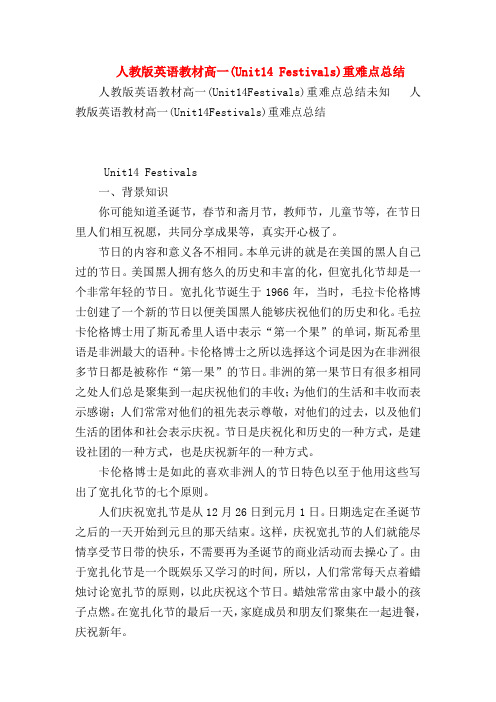
人教版英语教材高一(Unit14 Festivals)重难点总结人教版英语教材高一(Unit14Festivals)重难点总结未知人教版英语教材高一(Unit14Festivals)重难点总结Unit14 Festivals一、背景知识你可能知道圣诞节,春节和斋月节,教师节,儿童节等,在节日里人们相互祝愿,共同分享成果等,真实开心极了。
节日的内容和意义各不相同。
本单元讲的就是在美国的黑人自己过的节日。
美国黑人拥有悠久的历史和丰富的化,但宽扎化节却是一个非常年轻的节日。
宽扎化节诞生于1966年,当时,毛拉卡伦格博士创建了一个新的节日以便美国黑人能够庆祝他们的历史和化。
毛拉卡伦格博士用了斯瓦希里人语中表示“第一个果”的单词,斯瓦希里语是非洲最大的语种。
卡伦格博士之所以选择这个词是因为在非洲很多节日都是被称作“第一果”的节日。
非洲的第一果节日有很多相同之处人们总是聚集到一起庆祝他们的丰收;为他们的生活和丰收而表示感谢;人们常常对他们的祖先表示尊敬,对他们的过去,以及他们生活的团体和社会表示庆祝。
节日是庆祝化和历史的一种方式,是建设社团的一种方式,也是庆祝新年的一种方式。
卡伦格博士是如此的喜欢非洲人的节日特色以至于他用这些写出了宽扎化节的七个原则。
人们庆祝宽扎节是从12月26日到元月1日。
日期选定在圣诞节之后的一天开始到元旦的那天结束。
这样,庆祝宽扎节的人们就能尽情享受节日带的快乐,不需要再为圣诞节的商业活动而去操心了。
由于宽扎化节是一个既娱乐又学习的时间,所以,人们常常每天点着蜡烛讨论宽扎节的原则,以此庆祝这个节日。
蜡烛常常由家中最小的孩子点燃。
在宽扎化节的最后一天,家庭成员和朋友们聚集在一起进餐,庆祝新年。
高一英语unit14festivals.doc
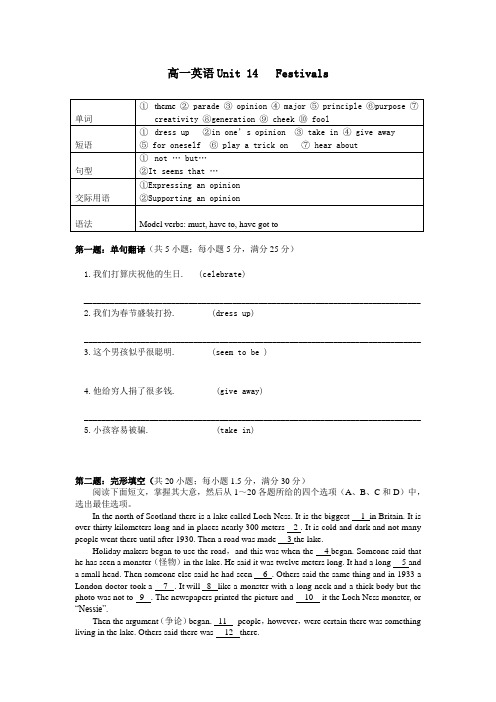
高一英语Unit 14 Festivals第一题:单句翻译(共5小题;每小题5分,满分25分)1.我们打算庆祝他的生日. (celebrate)_____________________________________________________________________________2.我们为春节盛装打扮. (dress up)_____________________________________________________________________________ 3.这个男孩似乎很聪明. (seem to be )_____________________________________________________________________________ 4.他给穷人捐了很多钱. (give away)_____________________________________________________________________________5.小孩容易被骗. (take in)_____________________________________________________________________________第二题:完形填空(共20小题;每小题1.5分,满分30分)阅读下面短文,掌握其大意,然后从1~20各题所给的四个选项(A、B、C和D)中,选出最佳选项。
In the north of Scotland there is a lake called Loch Ness. It is the biggest 1 in Britain. It is over thirty kilometers long and in places nearly 300 meters 2 . It is cold and dark and not many people went there until after 1930. Then a road was made 3 the lake.Holiday makers began to use the road,and this was when the 4 began. Someone said that he has seen a monster(怪物)in the lake. He said it was twelve meters long. It had a long 5 and a small head. Then someone else said he had seen 6 . Others said the same thing and in 1933 a London doctor took a 7 . It will 8 like a monster with a long neck and a thick body but the photo was not to 9 . The newspapers printed the picture and 10 it the Loch Ness monster, or “Nessie”.Then the argument(争论)began. 11 people,however,were certain there was something living in the lake. Others said there was 12 there.In 1961, a lot of people joined together to make a real 13 to see and photograph the monster 14 there was one! Several times people thought they saw something but after ten years there was 15 no real proof(证据).Later underwater television cameras were used, but 16 found any real proof. However, they 17 find some-thing interesting: a huge underwater cave. It was big enough to be 18 of a monster, but of course, this was not a proof.In 1975, however, some American scientists 19 a search group. They used an underwater camera(摄像机). It took pictures every seventy seconds. Some of the pictures seemed to show a red-brown creature(生物). Its 20 was about four meters long and had a very ugly head on the end of a four-meter neck. Many people then began to believe in the monster. But even today we can’t be certain.1. A. river B. ocean C. sea D. lake2. A. wide B. tall C. deep D. high3. A. in B. over C. around D. above4. A. accidents B. meetings C. sayings D. stories5. A. eye B. ear C. nose D. neck6. A. it B. one C. some D. all7. A. photo B. map C. gun D. chance8. A. sounded B. looked C. felt D. would9. A. clean B. clear C. taken D. shown10. A. called B. believed C. thought D. regarded11. A. Some B. More C. All D. No12. A. nothing B. anything C. monsters D. everything13. A. effort B. thing C. interest D. trip14. A. so B. but C. as D. if15. A. even B. still C. also D. yet16. A. someone B. no one C. anyone D. we17. A. did B. really C. were D. actually18. A. room B. house C. home D. ground19. A. found B. formed C. invited D. get20. A. head B. tail C. body D. head第三题:阅读理解(共5小题;每小题3分,满分15分)阅读下列短文,从每题所给的四个选项(A、B、C和D)中,选出最佳选项。
高一英语下册Unit14 Festivals 重点句型解析

高一英语下册Unit14 Festivals 重点句型解析高一英语下册Unit14 Festivals 重点句型解析重点句型解析1. Tg Festival, …and festivals help us understand who we aber where wand share oua happy future.春节,……和节日帮助我们了解我们是谁,记住我们从哪里来,并共同分享对美好未来的期望。
share v.(1)共同具有,合用e. g. Three da三个医生共用这个办公室。
(2)分享,分担e. g. They would shaand sorrows. 他们将同甘苦,共患难。
(3)share in分享,分担,共同努力e. g. We all sharedawhen he wlarship.当她获得奖学金时,我们都替他高兴。
(4) share with与……合用e. g. Would you mind sharing a bedroom with another guest?你介意和另一位客人共用一个房间吗?比较: spare(1)留出(时间作某事),挤出(时间)e. g. Can you spalp me? 你能挤出时间帮助我吗?(2)不用,匀出(给别人用)e. g. Father couldn’t spaaad to walk.爸爸要用车,因此约翰只得步行。
(3)放过,饶(命),不杀e. g. The king spared the livwomen and children.国王放过了妇女和儿童。
save v.(1)挽救,拯救e. g. They fought bravely and saved the country. 他们勇敢战斗拯救祖国。
(2)节省,省去,省着用,保护e. g. If we buy pld now, it will savg agaweek.如果我们现在买了足够的食物,这周就省了再上街购物了。
高一英语下册重点解析Festivals人教版
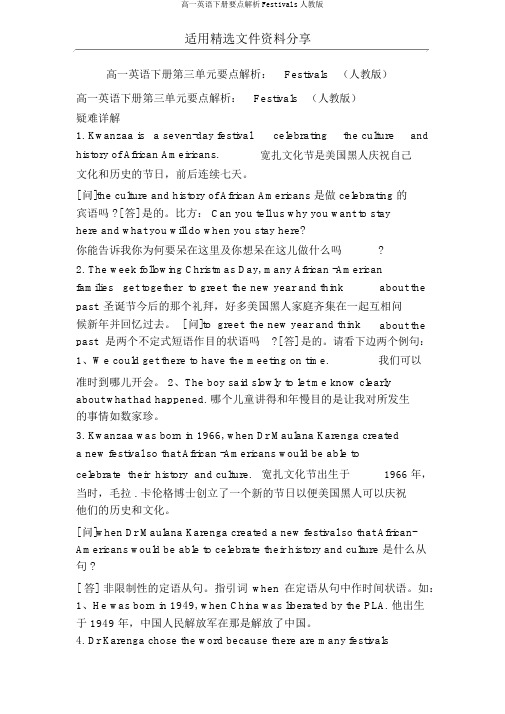
适用精选文件资料分享高一英语下册第三单元要点解析:Festivals(人教版)高一英语下册第三单元要点解析:Festivals(人教版)疑难详解1. Kwanzaa is a seven-day festival celebrating the culture and history of African Ameiricans.宽扎文化节是美国黑人庆祝自己文化和历史的节日,前后连续七天。
[ 问]the culture and history of African Americans 是做 celebrating 的宾语吗 ?[ 答] 是的。
比方: Can you tell us why you want to stayhere and what you will do when you stay here?你能告诉我你为何要呆在这里及你想呆在这儿做什么吗?2. The week following Christmas Day, many African -Americanfamilies get together to greet the new year and think about the past. 圣诞节今后的那个礼拜,好多美国黑人家庭齐集在一起互相问候新年并回忆过去。
[ 问]to greet the new year and think about the past是两个不定式短语作目的状语吗?[ 答] 是的。
请看下边两个例句:1、We could get there to have the meeting on time.我们可以准时到哪儿开会。
2、The boy said slowly to let me know clearlyabout what had happened. 哪个儿童讲得和年慢目的是让我对所发生的事情如数家珍。
3.Kwanzaa was born in 1966, when Dr Maulana Karenga createda new festival so that African -Americans would be able tocelebrate their history and culture. 宽扎文化节出生于1966 年,当时,毛拉 . 卡伦格博士创立了一个新的节日以便美国黑人可以庆祝他们的历史和文化。
- 1、下载文档前请自行甄别文档内容的完整性,平台不提供额外的编辑、内容补充、找答案等附加服务。
- 2、"仅部分预览"的文档,不可在线预览部分如存在完整性等问题,可反馈申请退款(可完整预览的文档不适用该条件!)。
- 3、如文档侵犯您的权益,请联系客服反馈,我们会尽快为您处理(人工客服工作时间:9:00-18:30)。
高一英语下册Unit14 Festivals 知识点整理高一英语下册Unit14Festivals知识点整理英语小窍门十二条经典英语谚语Painpastispleasure.2.wisdominthemindisbetterthanmoneyinthehand.3.Nothingisimpossibleforawillingheart.4.Allthingsaredifficultbeforetheyareeasy.5.Greathopesmakegreatman.6.Godhelpsthosewhohelpthemselves.7.Fourshortwordssumupwhathasliftedmostsuccessfulindividualsabovethecrowd:alittle,bitm ore.[比别人多一点努力、多一点自律、多一点决心、多一点反省、多一点学习、多一点实践、多一点疯狂,多一点点就能创造奇迹!]8.Indoingwelearn.9.Eastorwest,homeisbest.10.Twoheadsarebetterthanone.11.Goodcompanyontheroadistheshortestcut.12.constantdroppingwearsthestone.重点词汇解析1.honorvt.尊敬e.g.childrenshouldhonourtheirfatherandmother.孩子应该尊敬父母。
对……表示敬意e.g.Flowerswereplacedtheretohonourhismemory.鲜花摆放在那里为了纪念他使感到荣幸e.g.youhonourusbybeingwithustoday.今天你和我们在一起这是我们的荣幸。
Iamhonouredtobeaskedtospeakhere.被邀请在此讲话是我的荣幸。
honourn.荣誉,光荣e.g.Theyfightforthehonouroftheircountry.他们为祖国的荣誉而战。
人格,信誉Amanofhonourwouldnotbehaveinsocowardlyway.一个高尚的人行为处事不会这么懦弱。
尊敬,敬重e.g.onemustshowhonourtoone’sparents.一个人必须尊敬父母。
使感到光荣的人或事,荣幸e.g.It’sanhonourtomeetyou.见到你十分荣幸。
比较:inhonourof为了e.g.Itisonlyadanceinhonourofherbirthday.这只是纪念她生日的一个舞会。
Amemorialmeetingwasheldinhishonour.为了纪念他而举行纪念会。
havethehonour有幸……,荣幸地e.g.mayIhavethehonourofyourcompanyatdinner?我能有幸与您共进晚餐吗?2.determinevt.决定e.g.Hisfuturehasnotbeendetermined,buthemaystudymedicine.他还没决定好未来,但他可能学医。
canwenowdeterminethedateforourparty?我们现在能决定派对的日期吗?决心,决意,决定,决心,下定决心determine+不定式todoe.g.Shedeterminedtogothatveryafternoon.她决心就在那个下午走。
determine+从句Hehadbeendeterminedthatnooneshouldknow.他决意不让任何人知道。
determined过去分词作定语或表语,果断,坚定,坚决e.g.Hisvoicewasdetermined,andhiseyeswereflashing.他的声音很坚决,他的眼睛闪闪发亮。
determinationn.决心e.g.Hecamewiththedeterminationofstaying/tostayoneweek.他决心呆一周。
决定e.g.Theboycametoadeterminationtorunawayfromschool.男孩决定逃学。
self-determinationn.自主,自我决定3.purposen.目的,意图,目标e.g.whatisyourpurposeindoingthis?你做这件事的目的是什么?比较:for…purpose为了……目的onpurpose有意地,故意地,特意e.g.IfIgothereinfuture,itwillbeforthepurposeofseeingyou.如果我今后去那儿的话,就是为了见你。
I’vecomeonpurposetospeaktoyou.我来是特意要与你谈谈。
Shediditonpurpose.她是故意那样做。
4.remindern.提醒的人,暗示e.g.Pleasegivemeareminderthisafternoontophonehim.请下午提醒我给他打电话。
remindv.使……想起,提醒+of短语e.g.ThatstoryyouhavejusttoldremindsmeofanexperienceIoncehad.你刚刚讲的故事使我想起了我曾经有过的经历。
+sb.todoe.g.Pleaseremindmetowritethatletter.请提醒我写信。
+从句e.g.ThesightoftheclockremindedmethatIwaslate.看见时钟使我想起我迟到了。
parev.compare…with…比较,指同类事物的具体比较parethesetwolanguages,andwecanseetherearedifferencesaswellassimilarities. 比较这两种语言,可以发现它们有同有异。
Parentsliketocomparetheirownchildrenwithotherchildren.父母们总喜欢把自己的孩子与别的孩子进行比较。
compare…to…比作,指非同类事物的抽象比较e.g.Shakespearecomparedtheworldtoastage.莎士比亚把人世比作舞台。
Peopleoftencomparegirlstoflowers.人们经常把女孩子比作花朵。
comparedto/with…与……比起来,常在句中作状语,可位于句首或句尾,to和with可通用。
Itwasasmallplacethencomparedto/withwhatitisnow.和现在比起来,那时它还是个小地方。
6.表示穿着的动词puton表示穿上的动作e.g.Heputonhiscoatandwentouthurriedly.他穿上外衣匆匆忙忙地出去了。
wear表示穿着状态,意义最广,可用于衣服、鞋、帽、袜、手套、眼镜、手表、徽章、首饰,还可表示头发、胡须的式样,带有某种表情或样子。
e.g.Hewasashortmanwearingthickglasses.他是一个带着厚厚的眼镜的矮小的人。
dress既可表示动作也可表示状态,作及物动词时,后面宾语是人,即dresssb./oneself或bedressedinsth.e.g.Shedressedthebabyinred.她给孩子穿上了红色的衣服。
haveon表示穿着状态,无进行时。
e.g.Shehadareddresson.她穿了一件红裙子。
beinsth.表示状态e.g.He’sinplainclothes.他身着便装。
whatcolourisyourchildin?你的孩子穿着什么颜色的衣服?7.light的用法adj.明亮的,浅色的e.g.Hisroomislightandairy.他的房间又亮又通风。
Itgetslightataboutsixo’clock.六点左右天亮。
Shehasalightgreendress.她有一条淡绿色的裙子。
n.①光线,亮光,但如表示一种光线时,尤其是被形容词修饰时,前可加不定冠词。
e.g.Thetest-tubewasglowingwithafaintbluelight.试管里发出微弱的蓝光。
②灯,灯光,发光物,引火物e.g.Therewerenolightsoninanyofficeroom.没有一个办公室里有灯光。
v.和①点燃e.g.whenitwasdarkwelitthecandles.天黑时我们点上了蜡烛。
②照亮e.g.ourstreetsarelitbyelectricity.街道被灯光照亮。
③变得亮起来,开朗起来e.g.Herfacelightedwhenshesawwhoitwas.当她看清是谁时,她的脸亮了起来。
Suddenlyasmilelitherface.突然微笑使她的脸亮了起来。
lightup动词短语①照亮,点亮e.g.Theburningbuildinglitupthewholestreet.燃烧的建筑物照亮了整条街道。
②容光焕发,春风满面e.g.Herfacelitupwhensheheardthegoodnews.当她听到好消息时,脸上露出喜色。
注意:light的过去分词有两种:lighted,lit当作定语修饰名词时,用lighted。
e.g.alightedcandle一支点着的蜡烛。
mon用法及common,usual,ordinary,general区别common①共同的,共有的e.g.Englishistheircommonlanguage.英语是他们的共同语言。
②普通的,一般的,平常的Nothingiscommonerthanthat.没有比此更普通的。
③常见的,到处可见的e.g.Isthiswordincommonuse?这个字常用吗?④incommon共同的e.g.wehavemanythingsincommon.我们有许多共同之处。
common,general,ordinary,usual区别common侧重“普通”,表示“时时发生,人所共有”,并含有“并不高贵,地位低下”之意,指符合或具有全体共有的特征,其反义词为rare。
e.g.acommonsaying俗语acommonwish一个共同的愿望commonsense常识commonknowledge普通知识ThisisagrammaticalmistakecommonamongbeginnersinEnglish.这是个初学英语的人易犯的错误。
general侧重“普遍”,表示在大多数人或事物中流行并受到关注,不含有“地位低下”之意,其反义词为specific。
e.g.generalreaders一般读者ageneralidea一个普通的观点ordinary与common基本同义,侧重“外表平凡的,普通的”,表示“随时可以碰到,不值得惊奇”,其反义词为superior。
